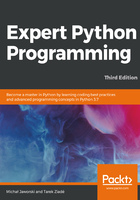
Virtual environments using Docker
Containers are an alternative to full machine virtualization. It is a lightweight method of virtualization, where the kernel and operating system allow multiple isolated user space instances to be run. OS is shared between containers and the host, so it theoretically requires less overhead than in full virtualization. Such a container contains only application code and its system-level dependencies, but, from the perspective of processes running inside, it looks like a completely isolated system environment.
Software containers got their popularity mostly thanks to Docker, which is one of the available implementations. Docker allows to describe its container in the form of a simple text document called Dockerfile. Containers from such definitions can be built and stored. It also supports incremental changes, so if new things are added to the container then it does not need to be recreated from scratch.
Let's compare containerization and virtualization in the next section